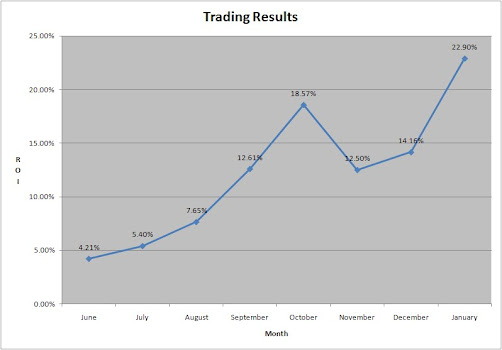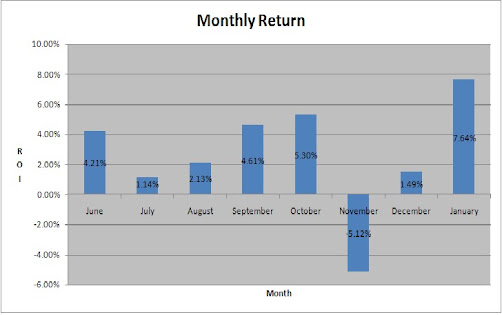Trading Account

Monthly Trading Results

Monday, August 31, 2009
Sunday, August 30, 2009
Trading update 8/30
Opened long position at 1.5155. 1.5135 is still support and until we break that level I'll probably be a buyer here.
Friday, August 28, 2009
Trading update 8/28
Closed my short trade which makes me all cash going into the weekend. The performance charts have been updated as well.
Thursday, August 27, 2009
Trading update 8/27
Closed last long position at 1.5233. Now holding 1 short position from yesterday.
Wednesday, August 26, 2009
Trading update 8/26
Closed 1 long position during this morning's opening bell pop. Entered short position at 1.5203. Now have 1 long and 1 short position open in the EURCHF.
Friday, August 21, 2009
Weekly wrap up
I opened two longs positions this week and am holding both going into the weekend. The trend seems to be decidedly down, but the pair couldn't seem to break through the 1.5150 mark with any force. Towards the end of the day today there was a nice move up on what could have been some short covering in the EUR/USD. I think this shows that traders are still on edge about intervention from the SNB and don't want to be short when something happens. This fear could come into play over the next few weeks and give the EUR/CHF a reason to rally on any good news.
Thursday, August 20, 2009
Long positions open
Still holding 2 long positions in the EUR/CHF. The pair is having a tough time with the 1.5150 level, spending a few hours each day right there. A solid break below will probably lead down fairly quickly and present another long entry around 1.5100.
Wednesday, August 19, 2009
Tuesday, August 18, 2009
EUR/CHF udpate
EURO-SWISS: Trading lower now back under Chf1.5200 area amid light
flows and despite earlier remarks from SNB`s Jordan reiterating the
bank`s desire that the Chf not strengthen inordinately due to the
deflation risks that represents. Pair trading saw lows at Chf1.5185 a
short while ago retreating from Chf1.5215 area seen as Jordan remarks
were reported the pair back near the early European session lows.
SNB news update
FRANKFURT (MNI) - It is too early yet for the Swiss National Bank
to normalize its monetary policy and the bank will stick to its low
interest rate policy as well as its efforts to keep the franc from
appreciating SNB board member Thomas Jordan said in an interview
published Tuesday afternoon.
Asked by Swiss financial daily Handelszeitung whether the SNB was
preparing to normalize its monetary policy Jordan responded: "It is
still too early for that. The economic environment and the inflationary
outlook do not yet permit us to consider a normalization of monetary
policy."
He continued: "At the moment there are no indications that we need
to consider a change of monetary policy. We will stick for the time
being to our de facto zero interest rate policy as well as to our
extraordinary measures against an appreciation of the franc."
Jordan also warned that one should not assume that current low
interest rates are the norm.
"One should not forget that the interest rate could suddenly be
significantly higher" he said adding that households companies and
banks must act in a way that allows them to benefit from low interest
rates today without creating medium-term stability problems.
The SNB will continue to buy both covered and corporate bonds so as
to prevent a fresh rise of risk premia. "We will remain active" Jordan
said. "The time to stop or put a term on these measures has not come
yet."
"We do not make known our threshold for intervention" Jordan said
when pressed about the point at which the SNB intervenes to stop an
appreciation of the franc.
Further pushed as to whether the bank intervenes as soon as the
euro approaches Sfr 1.50 Jordan insisted "we decide situationally if
we want to intervene. The market here has up to now understood our
strategy well."
Swiss GDP is likely to contract by 2.5% to 3.0% in 2009 Jordan
said adding that the path to recovery will be slow.
"In mid-2010 Swiss GDP should return to positive territory. In the
first half we are likely still to see negative growth rates" Jordan
said. He also warned that one should not expect to see pre-crisis growth
rates for some time.
"We still cannot dismiss deflationary risks in Switzerland" Jordan
insisted. He explained that risks could emerge "if the world economy
does not recover as it should or if the franc were to strongly
appreciate."
Despite Switzerland`s expansive monetary policy "we consider
inflation risks in Switzerland to be low presently and also in the
medium-term" he said.
Nevertheless "we cannot completely exclude this risk. The
normalization of monetary policy will be a very difficult tightrope
walk. We will however do everything to secure price stability in
Switzerland in the future as well" he assured.
Jordan warned that some inflationary pressure could be imported.
"In certain countries inflationary risks are indeed clearly greater
than [in Switzerland]...There could be a certain inflationary pressure
coming from abroad."
Asked what would prompt the SNB to tighten its monetary policy
stance Jordan said that inflation forecasts exceeding the central
bank`s price stability target would be one motivation. "This is not the
case today."
Another reason to tighten monetary policy would be too low interest
rates distorting the Swiss economy Jordan said though he dismissed any
such tendency at the moment.
The inflationary fears of many investors in Switzerland were
exaggerated.
"For businesses it has certainly not become easier [to obtain
credit] but in general we do not have a credit crunch in Switzerland"
Jordan said.
Link to Zero Hedge blog post about the CHF
This is from the Zero Hedge blog which is always very interesting.
http://www.zerohedge.com/article/short-chf-banking-secrecy-dead
EUR/CHF news update
EUR/CHF: Rally Continues, 1.5230/50 Resistance-Zone Next Up London, August 18. 1.5222 hit as EUR/CHF continues/accelerates its morning appreciation following the stronger-than-expected August ZEW reading. EUR/USD might have failed to sustain its initial foray above 1.4150 but Euro crosses are looking more robust and locals suggest the 1.5230/50 resistance-zone is next up should the single currency continue to outpace the mountain unit.
Monday, August 17, 2009
Swiss retail sales results
Here is the news update about Swiss retail sales. Looks like they picked a similar area of resistance or the EUR/CHF and are bullish on both pairs mentioned above certain levels.
Macro players pressured the Franc into the release, with USD/CHF hitting a 1.0789 peak. This was aided by the EUR/CHF recovery to the 1.5240 highs, with locals once again jittery over official Swiss interests in the cross towards 1.5200. Offers into the 1.08-area will remain in focus following the release, as long as EUR/CHF continues to head higher. Look for a pop above the figure to generate fresh follow-through.
Saturday, August 15, 2009
Next week's economic data releases
Monday 8/17 3:15AM EST Retail Sales CHF Previous: -1.4% Expected: +0.8%
Thursday 8/20 2:15AM EST Trade Balance CHF Previous: 1.57B Expected: 1.79B
Friday 8/21 10:00AM EST Fed Chairman Ben Bernanke Speaks
The actual economic data is not likely to have a significant impact on the currency markets, but we
need to be aware of what is going on in the countries we trade. I'm not sure where the Fed Chairman
is speaking but he can move markets so it might be wise to avoid certain trades around that time.
Friday, August 14, 2009
Account finally switched over
I haven't taken any trades for the past 2 weeks because I am switching my primary account from FXSolutions to DBFX. This process is now complete and I'll be up and running on Sunday. I'm really looking forward to getting back into the market, however the month of August can be lackluster when it comes to volume and volatility so we'll have to see what opportunities come up.
Article about how to gauge your success as a trader
The author has an agenda to pitch his own trading education program, but brings up some very valid points about tracking and analyzing performance beyond net profit.
http://www.moneyshow.com/trading/Tips_for_Traders.asp?aid=DAYTRADERS-17305Thursday, August 13, 2009
Euro-Swiss News Update
EURO-SWISS: BNP Paribas strategists note that channel support for
euro-Swiss (currently Chf1.5305) comes in at Chf1.5270. "A break of
Chf1.5270 opens downside potential downside potential to Chf1.5080"
they say. BNPP also notes scope for a new wave of risk aversion.
"Reports that NYSE volume remains at the lowest levels of the year have
raised fears that recent equity gains are vulnerable and were more
attributable to cutting of shorts than genuine demand" the strategists
say. Any larger stock sell-off would likely mean increased demand for
low yielding currencies (Swissy) they say. Volume on the Dow Jones
Industrial Average peaked at 9.098bn contracts on March 18 followed by
another peak of 9.12bn on May 7. Low volume was seen on Jan 2 (4.048bn)
and July 10 (3.912bn). In August volume has ranged from 5.4bn contracts
(Aug 10) to 6.8bn contracts (Aug 7)
8/13/2009 10:50:11 AM
EURO-SWISS
BNP Paribas strategists note that for....
euro-Swiss (currently Chf1.5305) comes in at Chf1.5270. "A break of
Chf1.5270 opens downside potential downside potential to Chf1.5080"
they say. BNPP also notes scope for a new wave of risk aversion.
"Reports that NYSE volume remains at the lowest levels of the year have
raised fears that recent equity gains are vulnerable and were more
attributable to cutting of shorts than genuine demand" the strategists
say. Any larger stock sell-off would likely mean increased demand for
low yielding currencies (Swissy) they say. Volume on the Dow Jones
Industrial Average peaked at 9.098bn contracts on March 18 followed by
another peak of 9.12bn on May 7. Low volume was seen on Jan 2 (4.048bn)
and July 10 (3.912bn). In August volume has ranged from 5.4bn contracts
(Aug 10) to 6.8bn contracts (Aug 7)
8/13/2009 10:50:11 AM
EURO-SWISS
BNP Paribas strategists note that for....
Wednesday, August 12, 2009
Trading is like Chess
Great blog post that compares trading to playing chess, which is a very relevant analogy for me.
http://mu.stocktwits.com/annemarietrades/
Monday, August 10, 2009
Stockwtits TV
Stocktwits.tv Just found this site last week. While the name suggests a stock focus there is still a benefit to forex traders. MacroTwits with Gregor Macdonald is a very interesting weekly show about the overall macroeconomic situation for the U.S. During yesterday's show he mentioned that there is a possibility of the U.S. Dollar becoming a "funding currency" like the Yen has been for a while. I believe that he means the Greenback will have such a low interest rate for such a long time, like the Yen, that people will start doing a carry trade with it to fund other investments. Quite an interesting idea.
Monday, August 3, 2009
July month end wrap up
July was a much slower month for trading that June. This wasn't because there were fewer trading opportunities, instead two specific issues limited my trading. First, I started adding long positions after the strong move in late June. This left me unable to trade any shorts during the entire month due to the non-hedging rules that were put into place. Second, with vacation and moving to a new broker I did not want to have any more exposure in the account than necessary so did not add new long positions after mid-month. Ending up with a profit is still nice. August could also be a very slow month as I believe many traders around the world, especially in Europe take holiday around this time. I will still follow my trading plan but will wait until my funds are deposited at the new broker before opening any more trades.
Subscribe to:
Comments (Atom)